| Listing 1 - 10 of 11 | << page >> |
Sort by
|
Book
ISBN: 6610704848 1280704845 9786610704842 1429455292 1607502119 6000004281 143370126X 9781429455299 Year: 2006 Publisher: Amsterdam ; Washington, DC : IOS Press,
Abstract | Keywords | Export | Availability | Bookmark
 Loading...
Loading...Choose an application
- Reference Manager
- EndNote
- RefWorks (Direct export to RefWorks)
Aims to provide a forum for genuine interdisciplinary exchange in the spirit of a unified effort towards solving the problems of ontology, with an eye to both theoretical issues and concrete applications. This book contains a range of areas, all of which are important to the development of formal ontologies.
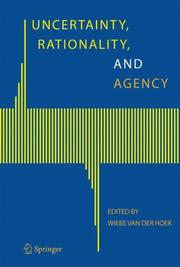
ISBN: 9781402046308 1402046308 9786611103248 1281103241 1402046316 Year: 2006 Publisher: Dordrecht : Springer,
Abstract | Keywords | Export | Availability | Bookmark
 Loading...
Loading...Choose an application
- Reference Manager
- EndNote
- RefWorks (Direct export to RefWorks)
This book is about Rational Agents, which can be humans, players in a game, software programs or institutions. Typically, such agents are uncertain about the state of affairs or the state of other agents, and under this partial information they have to decide on which action to take next. This book collects chapters that give formal accounts not only of Uncertainty, Rationality and Agency, but also of their interaction: what are rational criteria to accept certain beliefs, or to modify them; how can degrees of beliefs guide an agent in making decisions; why distinguish between practical and epistemic rationality when agents try to coordinate; what must be common beliefs between agents about each other's rationality in order to act rationally themselves; can an agent assign probabilities to planned actions; how to formalise assumptions about a rational speaker in a conversation obeying Gricean maxims; how should a rational agent best represent the states, consequences, and acts that constitute the agent's rational decision problem? This volume should appeal to researchers addressing issues in artificial systems that have to gather information in order to obtain Knowledge, reason about it and then make a Rational decision about which Action to take next.
Epistemics. --- Knowledge representation (Information theory). --- Knowledge, Theory of. --- Information Technology --- Artificial Intelligence --- Logique mathématique --- Philosophie --- Logique
Book
ISBN: 2746212951 9782746212954 Year: 2006 Publisher: Paris: Lavoisier,
Abstract | Keywords | Export | Availability | Bookmark
 Loading...
Loading...Choose an application
- Reference Manager
- EndNote
- RefWorks (Direct export to RefWorks)
Searching, Bibliographical --- Terms and phrases --- Information retrieval --- Recherche documentaire --- Terminologie --- Recherche de l'information --- Information science --- Information storage and retrieval systems --- Knowledge representation (Information theory) --- Information organization --- terminology --- Traitement de l'information --- Information processing
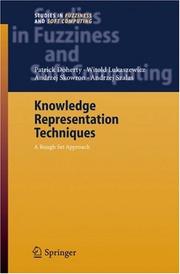
ISBN: 9783540335184 3540335188 9786610937028 1280937025 3540335196 Year: 2006 Publisher: Berlin, Germany ; New York, New York : Springer,
Abstract | Keywords | Export | Availability | Bookmark
 Loading...
Loading...Choose an application
- Reference Manager
- EndNote
- RefWorks (Direct export to RefWorks)
The basis for the material in this book centers around a long term research project with autonomous unmanned aerial vehicle systems. One of the main research topics in the project is knowledge representation and reasoning. The focus of the research has been on the development of tractable combinations of approximate and nonmonotonic reasoning systems. The techniques developed are based on intuitions from rough set theory. Efforts have been made to take theory into practice by instantiating research results in the context of traditional relational database or deductive database systems. This book contains a cohesive, self-contained collection of many of the theoretical and applied research results that have been achieved in this project and for the most part pertain to nonmonotonic and approximate reasoning systems developed for an experimental unmanned aerial vehicle system used in the project. This book should be of interest to the theoretician and applied researcher alike and to autonomous system developers and software agent and intelligent system developers.
Knowledge representation (Information theory) --- Rough sets. --- Représentation des connaissances --- Ensembles approximatifs --- Knowledge representation (Information theory). --- Rough sets --- Civil & Environmental Engineering --- Engineering & Applied Sciences --- Applied Mathematics --- Computer Science --- Civil Engineering --- Rough set theory --- Theory of rough sets --- Representation of knowledge (Information theory) --- Computer science. --- Artificial intelligence. --- Engineering. --- Applied mathematics. --- Engineering mathematics. --- Computer Science. --- Artificial Intelligence (incl. Robotics). --- Appl.Mathematics/Computational Methods of Engineering. --- Engineering, general. --- Set theory --- Artificial intelligence --- Information theory --- Artificial Intelligence. --- Mathematical and Computational Engineering. --- Construction --- Industrial arts --- Technology --- Engineering --- Engineering analysis --- Mathematical analysis --- AI (Artificial intelligence) --- Artificial thinking --- Electronic brains --- Intellectronics --- Intelligence, Artificial --- Intelligent machines --- Machine intelligence --- Thinking, Artificial --- Bionics --- Cognitive science --- Digital computer simulation --- Electronic data processing --- Logic machines --- Machine theory --- Self-organizing systems --- Simulation methods --- Fifth generation computers --- Neural computers --- Mathematics --- Knowledge Representation (Information Theory) --- Philosophy
Book
ISBN: 1281103241 9786611103248 1402046316 Year: 2006 Publisher: Dordrecht : Springer,
Abstract | Keywords | Export | Availability | Bookmark
 Loading...
Loading...Choose an application
- Reference Manager
- EndNote
- RefWorks (Direct export to RefWorks)
This book is about Rational Agents, which can be humans, players in a game, software programs or institutions. Typically, such agents are uncertain about the state of affairs or the state of other agents, and under this partial information they have to decide on which action to take next. This book collects chapters that give formal accounts not only of Uncertainty, Rationality and Agency, but also of their interaction: what are rational criteria to accept certain beliefs, or to modify them; how can degrees of beliefs guide an agent in making decisions; why distinguish between practical and epistemic rationality when agents try to coordinate; what must be common beliefs between agents about each other's rationality in order to act rationally themselves; can an agent assign probabilities to planned actions; how to formalise assumptions about a rational speaker in a conversation obeying Gricean maxims; how should a rational agent best represent the states, consequences, and acts that constitute the agent's rational decision problem? This volume should appeal to researchers addressing issues in artificial systems that have to gather information in order to obtain Knowledge, reason about it and then make a Rational decision about which Action to take next.
Knowledge, Theory of. --- Epistemics. --- Knowledge representation (Information theory) --- Representation of knowledge (Information theory) --- Artificial intelligence --- Information theory --- General semantics --- Knowledge, Theory of --- Epistemology --- Theory of knowledge --- Philosophy --- Psychology --- Artificial intelligence. --- Logic. --- Economic theory. --- Artificial Intelligence. --- Economic Theory/Quantitative Economics/Mathematical Methods. --- Economic theory --- Political economy --- Social sciences --- Economic man --- Argumentation --- Deduction (Logic) --- Deductive logic --- Dialectic (Logic) --- Logic, Deductive --- Intellect --- Science --- Reasoning --- Thought and thinking --- AI (Artificial intelligence) --- Artificial thinking --- Electronic brains --- Intellectronics --- Intelligence, Artificial --- Intelligent machines --- Machine intelligence --- Thinking, Artificial --- Bionics --- Cognitive science --- Digital computer simulation --- Electronic data processing --- Logic machines --- Machine theory --- Self-organizing systems --- Simulation methods --- Fifth generation computers --- Neural computers --- Methodology
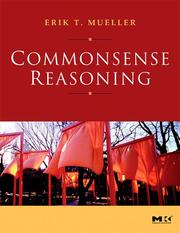
ISBN: 9780123693884 0123693888 9786611050498 1281050490 0080476619 9780080476612 9781281050496 6611050493 Year: 2006 Publisher: Amsterdam ; Boston : Elsevier Morgan Kaufmann,
Abstract | Keywords | Export | Availability | Bookmark
 Loading...
Loading...Choose an application
- Reference Manager
- EndNote
- RefWorks (Direct export to RefWorks)
To endow computers with common sense is one of the major long-term goals of Artificial Intelligence research. One approach to this problem is to formalize commonsense reasoning using mathematical logic. Commonsense Reasoning is a detailed, high-level reference on logic-based commonsense reasoning. It uses the event calculus, a highly powerful and usable tool for commonsense reasoning, which Erik T. Mueller demonstrates as the most effective tool for the broadest range of applications. He provides an up-to-date work promoting the use of the event calculus for commonsense reasoning, and bringing
Commonsense reasoning --- Artificial intelligence --- Logic, Symbolic and mathematical --- Automation --- Mathematics --- Data processing --- 681.3*I24 --- 681.3*I28 --- Knowledge representation formalisms and methods: frames and scripts; predicate logic; relation systems; representation languages; procedural and rule-based representations; semantic networks (Artificial intelligence) --- Problem solving, control methods and search: backtracking; dynamic program- ming; graph and tree search strategies; heuristics; plan execution, formationand generation (Artificial intelligence)--See also {681.3*F22} --- 681.3*I24 Knowledge representation formalisms and methods: frames and scripts; predicate logic; relation systems; representation languages; procedural and rule-based representations; semantic networks (Artificial intelligence) --- 681.3*I28 Problem solving, control methods and search: backtracking; dynamic program- ming; graph and tree search strategies; heuristics; plan execution, formationand generation (Artificial intelligence)--See also {681.3*F22} --- Algebra of logic --- Logic, Universal --- Mathematical logic --- Symbolic and mathematical logic --- Symbolic logic --- Algebra, Abstract --- Metamathematics --- Set theory --- Syllogism --- Common sense reasoning --- Reasoning --- AI (Artificial intelligence) --- Artificial thinking --- Electronic brains --- Intellectronics --- Intelligence, Artificial --- Intelligent machines --- Machine intelligence --- Thinking, Artificial --- Bionics --- Cognitive science --- Digital computer simulation --- Electronic data processing --- Logic machines --- Machine theory --- Self-organizing systems --- Simulation methods --- Fifth generation computers --- Neural computers --- Mathematics. --- Data processing. --- Automation.
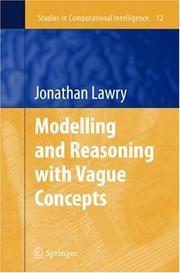
ISBN: 9780387290560 0387290567 9786610612291 1280612290 038730262X Year: 2006 Publisher: New York, United States : Springer,
Abstract | Keywords | Export | Availability | Bookmark
 Loading...
Loading...Choose an application
- Reference Manager
- EndNote
- RefWorks (Direct export to RefWorks)
Vagueness is central to the flexibility and robustness of natural language descriptions. Vague concepts are robust to the imprecision of our perceptions, while still allowing us to convey useful, and sometimes vital, information. The study of vagueness in Artificial Intelligence (AI) is therefore motivated by the desire to incorporate this robustness and flexibility into intelligent computer systems. Such a goal, however, requires a formal model of vague concepts that will allow us to quantify and manipulate the uncertainty resulting from their use as a means of passing information between autonomous agents. This volume outlines a formal representation framework for modelling and reasoning with vague concepts in Artificial Intelligence. The new calculus has many applications, especially in automated reasoning, learning, data analysis and information fusion. This book gives a rigorous introduction to label semantics theory, illustrated with many examples, and suggests clear operational interpretations of the proposed measures. It also provides a detailed description of how the theory can be applied in data analysis and information fusion based on a range of benchmark problems.
Computational linguistics. --- Semantics --- Knowledge representation (Information theory) --- Fuzzy sets. --- Fuzzy logic. --- Linguistique informatique --- Sémantique --- Représentation des connaissances --- Ensembles flous --- Logique floue --- Mathematical models. --- Modèles mathématiques --- Artificial intelligence. --- Electronic books. -- local. --- Expert systems (Computer science). --- Uncertainty (Information theory). --- Computational linguistics --- Fuzzy sets --- Fuzzy logic --- Languages & Literatures --- Engineering & Applied Sciences --- Mechanical Engineering --- Computer Science --- Mechanical Engineering - General --- Philology & Linguistics --- Mathematical models --- Information Technology --- Artificial Intelligence --- Knowledge representation (Information theory). --- Uncertainty (Information theory) --- Expert systems (Computer science) --- Models, Mathematical --- Sets, Fuzzy --- Knowledge-based systems (Computer science) --- Systems, Expert (Computer science) --- Measure of uncertainty (Information theory) --- Shannon's measure of uncertainty --- System uncertainty --- AI (Artificial intelligence) --- Artificial thinking --- Electronic brains --- Intellectronics --- Intelligence, Artificial --- Intelligent machines --- Machine intelligence --- Thinking, Artificial --- Computer science. --- Computers. --- Mathematical statistics. --- Pattern recognition. --- Information theory. --- Complexity, Computational. --- Computer Science. --- Theory of Computation. --- Artificial Intelligence (incl. Robotics). --- Complexity. --- Pattern Recognition. --- Information and Communication, Circuits. --- Probability and Statistics in Computer Science. --- Bionics --- Cognitive science --- Digital computer simulation --- Electronic data processing --- Logic machines --- Machine theory --- Self-organizing systems --- Simulation methods --- Fifth generation computers --- Neural computers --- Complexity, Computational --- Communication theory --- Communication --- Cybernetics --- Design perception --- Pattern recognition --- Form perception --- Perception --- Figure-ground perception --- Mathematics --- Statistical inference --- Statistics, Mathematical --- Statistics --- Probabilities --- Sampling (Statistics) --- Automatic computers --- Automatic data processors --- Computer hardware --- Computing machines (Computers) --- Electronic calculating-machines --- Electronic computers --- Hardware, Computer --- Computer systems --- Calculators --- Cyberspace --- Informatics --- Science --- Statistical methods --- Fuzzy mathematics --- Set theory --- Artificial intelligence --- Soft computing --- Information measurement --- Questions and answers --- Engineering. --- Optical pattern recognition. --- Mathematics. --- Artificial Intelligence. --- Math --- Optical data processing --- Pattern perception --- Perceptrons --- Visual discrimination --- Construction --- Industrial arts --- Technology --- Computational complexity. --- Automatic language processing --- Language and languages --- Language data processing --- Linguistics --- Natural language processing (Linguistics) --- Applied linguistics --- Cross-language information retrieval --- Mathematical linguistics --- Multilingual computing --- Nonlinear logic --- Logic, Symbolic and mathematical --- Fuzzy systems --- Representation of knowledge (Information theory) --- Information theory --- Data processing
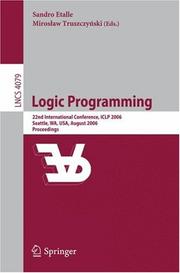
ISSN: 03029743 ISBN: 9783540366355 3540366350 3540366369 Year: 2006 Volume: 4079 Publisher: Berlin: Springer,
Abstract | Keywords | Export | Availability | Bookmark
 Loading...
Loading...Choose an application
- Reference Manager
- EndNote
- RefWorks (Direct export to RefWorks)
Logic programming --- Programmation logique --- Congresses. --- Congrès --- Information Technology --- Computer Science (Hardware & Networks) --- Computer Science --- Engineering & Applied Sciences --- Academic collection --- 681.3*D16 --- 681.3*I23 <063> --- 681.3*I24 <063> --- 681.3*D3 --- 681.3*F3 --- 681.3*F4 --- Computerwetenschap--?*D16 --- Deduction and theorem proving: answer/reason extraction; reasoning; resolution; metatheory; mathematical induction; logic programming (Artificial intelligence)--Congressen --- Knowledge representation formalisms and methods: frames and scripts; predicate logic; relation systems; representation languages; procedural and rule-based representations; semantic networks (Artificial intelligence)--Congressen --- Programming languages --- Logics and meanings of programs (Theory of computation) --- Mathematical logic and formal languages (Theory of computation) --- 681.3*I23 <063> Deduction and theorem proving: answer/reason extraction; reasoning; resolution; metatheory; mathematical induction; logic programming (Artificial intelligence)--Congressen --- 681.3*I24 <063> Knowledge representation formalisms and methods: frames and scripts; predicate logic; relation systems; representation languages; procedural and rule-based representations; semantic networks (Artificial intelligence)--Congressen --- 681.3*F4 Mathematical logic and formal languages (Theory of computation) --- 681.3*F3 Logics and meanings of programs (Theory of computation) --- 681.3*D3 Programming languages --- 681.3*D16 Computer science--?*D16 --- 681.3*D16 Computerwetenschap--?*D16 --- Computer science--?*D16 --- Conferences - Meetings --- Computer science. --- Software engineering. --- Computer programming. --- Programming languages (Electronic computers). --- Computer logic. --- Mathematical logic. --- Artificial intelligence. --- Computer Science. --- Software Engineering/Programming and Operating Systems. --- Programming Techniques. --- Artificial Intelligence (incl. Robotics). --- Programming Languages, Compilers, Interpreters. --- Logics and Meanings of Programs. --- Mathematical Logic and Formal Languages. --- Logic design. --- Artificial Intelligence. --- Design, Logic --- Design of logic systems --- Digital electronics --- Electronic circuit design --- Logic circuits --- Machine theory --- Switching theory --- AI (Artificial intelligence) --- Artificial thinking --- Electronic brains --- Intellectronics --- Intelligence, Artificial --- Intelligent machines --- Machine intelligence --- Thinking, Artificial --- Bionics --- Cognitive science --- Digital computer simulation --- Electronic data processing --- Logic machines --- Self-organizing systems --- Simulation methods --- Fifth generation computers --- Neural computers --- Informatics --- Science --- Computer software engineering --- Engineering --- Algebra of logic --- Logic, Universal --- Mathematical logic --- Symbolic and mathematical logic --- Symbolic logic --- Mathematics --- Algebra, Abstract --- Metamathematics --- Set theory --- Syllogism --- Computer science logic --- Logic, Symbolic and mathematical --- Computer languages --- Computer program languages --- Computer programming languages --- Machine language --- Languages, Artificial --- Computers --- Electronic computer programming --- Electronic digital computers --- Programming (Electronic computers) --- Coding theory --- Programming
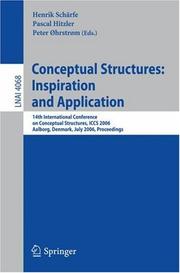
ISBN: 9783540358930 3540358935 3540359028 Year: 2006 Publisher: Berlin : Springer,
Abstract | Keywords | Export | Availability | Bookmark
 Loading...
Loading...Choose an application
- Reference Manager
- EndNote
- RefWorks (Direct export to RefWorks)
th The 14 International Conference on Conceptual Structures (ICCS 2006) was held in Aalborg, Denmark during July 16 – 21, 2006. Responding to the Call for Papers, we received 62 papers from 20 different countries, representing six different continents. This clearly indicates the international nature of the ICCS community as well as the widespread interest which was spawned by the previous conferences. By a thorough review process, 24 papers were selected to be included in this volume. In addition, six invited speakers made contributions which can be found in the first section of this volume. The theme of ICCS 2006––Conceptual Structures: Inspiration and Application–– points to a dual focus of interest that is also reflected in the constellation of papers. From the beginning of the planning of this conference, we focused on inspirational sources that have led to the current state of research in our community, by tracing important historical influences which daily effect work in representing knowledge and in handling representations of conceptual structures. At the same time, we also focused on ways in which these legacies are employed to further advance theory and practice in the field of knowledge representation and processing. With this volume, we believe that a valuable contribution to both aspects of this field is being made. We wish to express our appreciation to all the authors of submitted papers, to the members of the Editorial Board and the Program Committee for all their work and valuable comments.
Conceptual structures (Information theory) --- Graph theory --- Logic diagrams --- Knowledge representation (Information theory) --- Natural language processing (Computer science) --- Structures conceptuelles --- Théorie des graphes --- Logigrammes --- Représentation des connaissances --- Traitement automatique des langues naturelles --- Congresses. --- Congrès --- Computer Science --- Mechanical Engineering - General --- Engineering & Applied Sciences --- Mechanical Engineering --- Information Technology --- Artificial Intelligence --- Diagrams, Logic --- Logic --- Diagrams --- Graphic methods --- Computer science. --- Algorithms. --- Mathematical logic. --- Computer science --- Artificial intelligence. --- Computer Science. --- Artificial Intelligence (incl. Robotics). --- Discrete Mathematics in Computer Science. --- Mathematical Logic and Formal Languages. --- Algorithm Analysis and Problem Complexity. --- Information Systems Applications (incl. Internet). --- Mathematics. --- AI (Artificial intelligence) --- Artificial thinking --- Electronic brains --- Intellectronics --- Intelligence, Artificial --- Intelligent machines --- Machine intelligence --- Thinking, Artificial --- Bionics --- Cognitive science --- Digital computer simulation --- Electronic data processing --- Logic machines --- Machine theory --- Self-organizing systems --- Simulation methods --- Fifth generation computers --- Neural computers --- Computer mathematics --- Discrete mathematics --- Algebra of logic --- Logic, Universal --- Mathematical logic --- Symbolic and mathematical logic --- Symbolic logic --- Mathematics --- Algebra, Abstract --- Metamathematics --- Set theory --- Syllogism --- Algorism --- Algebra --- Arithmetic --- Informatics --- Science --- Foundations --- Computational complexity. --- Computer software. --- Artificial Intelligence. --- Software, Computer --- Computer systems --- Complexity, Computational --- Computer science—Mathematics. --- Application software. --- Application computer programs --- Application computer software --- Applications software --- Apps (Computer software) --- Computer software
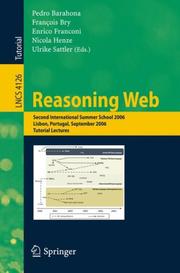
ISBN: 9783540384090 354038409X 354038412X Year: 2006 Volume: 4126 Publisher: Berlin ; New York : Springer,
Abstract | Keywords | Export | Availability | Bookmark
 Loading...
Loading...Choose an application
- Reference Manager
- EndNote
- RefWorks (Direct export to RefWorks)
Semantic Web --- Ontology --- Knowledge representation (Information theory) --- Query languages (Computer science) --- Web sémantique --- Ontologie --- Représentation des connaissances --- Langages d'interrogation --- Congresses --- Congrès --- Telecommunications --- Computer Science --- Engineering & Applied Sciences --- Electrical & Computer Engineering --- Web sémantique --- Représentation des connaissances --- Congrès --- EPUB-LIV-FT SPRINGER-B --- QLSs (Computer science) --- Query language systems (Computer science) --- Computer science. --- Computer communication systems. --- Database management. --- Information storage and retrieval. --- User interfaces (Computer systems). --- Bioinformatics. --- Computer Science. --- Information Systems Applications (incl. Internet). --- Information Storage and Retrieval. --- Computer Communication Networks. --- Database Management. --- User Interfaces and Human Computer Interaction. --- Bio-informatics --- Biological informatics --- Biology --- Information science --- Computational biology --- Systems biology --- Interfaces, User (Computer systems) --- Human-machine systems --- Human-computer interaction --- Data base management --- Data services (Database management) --- Database management services --- DBMS (Computer science) --- Generalized data management systems --- Services, Database management --- Systems, Database management --- Systems, Generalized database management --- Electronic data processing --- Communication systems, Computer --- Computer communication systems --- Data networks, Computer --- ECNs (Electronic communication networks) --- Electronic communication networks --- Networks, Computer --- Teleprocessing networks --- Data transmission systems --- Digital communications --- Electronic systems --- Information networks --- Telecommunication --- Cyberinfrastructure --- Network computers --- Informatics --- Science --- Data processing --- Distributed processing --- Programming languages (Electronic computers) --- Information storage and retrieva. --- Information storage and retrieval systems. --- Automatic data storage --- Automatic information retrieval --- Automation in documentation --- Computer-based information systems --- Data processing systems --- Data storage and retrieval systems --- Discovery systems, Information --- Information discovery systems --- Information processing systems --- Information retrieval systems --- Machine data storage and retrieval --- Mechanized information storage and retrieval systems --- Computer systems --- Electronic information resources --- Data libraries --- Digital libraries --- Information organization --- Information retrieval --- Application software. --- Application computer programs --- Application computer software --- Applications software --- Apps (Computer software) --- Computer software
| Listing 1 - 10 of 11 | << page >> |
Sort by
|

 Search
Search Feedback
Feedback About UniCat
About UniCat  Help
Help News
News